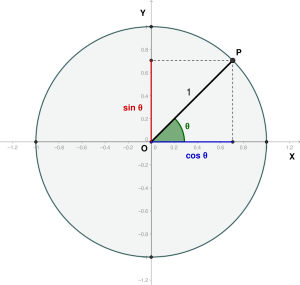
Starting in the fall of 2016, faculty at Bryn Mawr and seven partner liberal arts colleges (including LACOL member Vassar College) are field-testing faculty-authored online learning modules they have developed and refined over the past two years as part of the Blended, Just-in-Time Math Fundamentals program. Led by Bryn Mawr professor of physics, Elizabeth McCormack, the Math Fundamentals program tackles math review for students enrolled in introductory STEM (science, technology, engineering and math) courses. It is designed as a scalable, affordable method for helping students who are interested in STEM fields and generally college-ready in math, but who have areas of weakness or lack experience with applied mathematics, to build skills and confidence needed to thrive in introductory STEM courses.
For example, a student taking introductory physics will need to draw on trigonometry in order to solve certain types of vector problems. While most students encounter trigonometry at some point in high school math courses, the timing, breadth and depth of that exposure can vary considerably. To help these students, physics, chemistry and calculus professors at Allegheny, Bryn Mawr, Franklin & Marshall, Grinnell, Lafayette, Mills, Smith, St. Olaf, and Vassar colleges have worked with instructional designers to develop a “sandwich” approach to math review. Each module starts with a worked example of a canonical course problem — such as resolving vectors in introductory physics. This example identifies the fundamental math skills needed to solve the problem and provides links to online, interactive self-assessment and practice resources. According to the project manager Jennifer Spohrer, Manager of Educational Technology Services at Bryn Mawr:
These resources give students individualized feedback on their mastery of math fundamentals. Meanwhile, faculty, academic support staff, and peer tutors can review students’ work to provide additional assistance to those who need it. Students then solve a “do-it-yourself” version of the original problem to practice applying those skills in context.
The partner schools are developing materials using MyOpenMath, a free, online math homework and assessment system for high school and college mathematics supported by Lumen Learning, and Kahn Academy. The goals and outcomes of this project resonate with the work of LACOL’s Quantitative Skills group.
For more information about the Math Fundamentals program, see:



